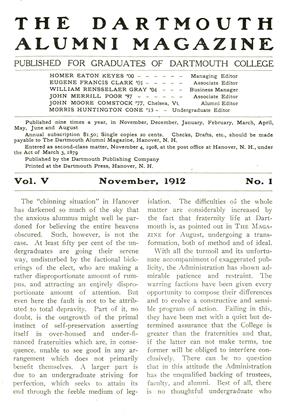On Thursday, October 10, President Taft honored Hanover with a brief visit. He had been making an automobile tour of the New England states, and very graciously accepted the invitation of President Nichols to visit Hanover, en route from Bretton Woods to Keene. President Taft reached Hanover shortly after noon and, having been entertained at luncheon by President and Airs. Nichols, was driven to Webster Hall. There a large body of students and townsfolk, together with a delegation of school children, was gathered to greet the distinguished guest. President Taft spoke from the automobile in which he was traveling; and immediately upon the close of his address, resumed his southward journey.
President Taft's visit, according to The Dartmouth, marks the second occasion when Dartmouth has received a president of the United States. Both Franklin Pierce and James A. Garfield visited Hanover before holding the presidential position; but James Monroe was the only one previous to Mr. Taft to come in his official capacity, as chief executive. The Dartmouth publishes an interesting account of that earlier visit which is well worth preservation :
"President Monroe spent the night of Monday, July 21, 1817, in Hanover. He was making a slow tour by coach through Massachusetts, New Hampshire, and Vermont. The Sabbath, July 20, was spent in Concord. Leaving there early Monday morning, the President journeyed through Andover, Wilmot, Springfield and Enfield, where he dined at Willis's at about 4 p. m. From Enfield he made a flying visit to the Shaker community and then returned to Lebanon, where he was met by a cavalcade from Hanover, which, increased by the residents of Lebanon, escorted him to this village. At Mink Brook President Monroe left his carriage and entered Hanover on horseback.
The arrival of the President was announced by a salute of the artillery, paraded for the purpose, and he was escorted directly to the College Church. From there he went to Mrs. Fuller's "elegant hotel," situated on the site of the present Inn. From the porch of the hotel, Colonel Brewster delivered an address and the President dined again.
"In the evening calls were made upon President Francis Brown, of Dartmouth College, and upon President Allen, of Dartmouth University, as his visit was made during the double occupation preceding the settlement of the Dartmouth College case. Mills Olcutt, father-in-law of Rufus Choate, the most prominent citizen of Hanover at that time, was also honored by a call from President Monroe. It is recorded that at each of these residences numbers of townspeople were introduced to the chief executive.
"The most interesting feature of the visit of President Monroe to Hanover, however, was his meeting with Madame Wheelock, widow of John Wheelock, the second president of Dartmouth College. Dr. John Wheelock had been dead about three months at the time of the President's visit. There was a bit of romance connected with the meeting, for Mrs. Wheelock, many years before, had nursed the President, then a lieutenant in the Revolutionary army, when he had been severely wounded in a foray in eastern Pennsylvania. The chronicle states that the rehearsal of the events of the affair made a lasting impression upon those present.
"Early Tuesday morning, after receiving deputations from Windsor, Royalton, Montpelier, and other towns, the President went to Strafford and visited the copper mines there. He returned to Norwich where he enjoyed an excellent dinner and then went to White River Junction on his way to the west."
Thus in the slow going days of horse and carriage transportation the President had time to dine frequently, and well, to call upon rival academic chieftains, to hobnob with local celebrities, to exchange early recollections with a distinguished widow, and to view the wonders of a neighboring mine. Official deputations came from fairly distant towns and villages; escorting cavalcades kicked up the dust for miles around Hanover It was an occasion for much dignified salutation and considerable decorative oratory. In these less leisurely times the President rushes in by motor; allows a bare, half hour for luncheon, speaks from his briefly halted car, and speeds on. Colonel Brewster delivered an address in honor of President Monroe; Doctor Nichols, always the soul of brevity, cut his introductory remarks to less than ten words; there was no time for more.
 View Full Issue
View Full Issue
More From This Issue
Article
-
 Article
ArticleWINTER SPORTS UNION TO HOLD MEET IN HANOVER
August, 1925 -
 Article
Article"SAFE AT LAST IN THE WIDE WIDE WORLD":
March 1950 -
 Article
Article"Dartmouth Undying"
-
 Article
ArticleThe Doctor is In Oxford
April 1993 -
 Article
ArticleModern Corporation
APRIL 1994 -
 Article
Article1953 Dartmouth Parents Committee
December 1953 By WILLIAM H. COULSON, CHAIRMAN








